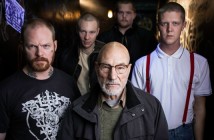To Russia with Love (2014)
Director: Noam Gonick
Country: USA | Russia
Genre: Documentary | Sport
Editor’s Notes: The following review is part of our coverage of the 25th edition of the Inside Out Toronto: LGBT Film Festival which runs from May 21 to 31. For more information on visit http://www.insideout.ca/ and follow Inside Out on Twitter at @InsideOutTO.
One of the major controversies headed into the 2014 Sochi Olympics in Russia, was concern for lesbian, gay, bisexual, and transgender athletes. In June 2013, President Vladimir Putin signed a bill into law that aims to protect children from the “alternative” ways of the LGT lifestyle that could harm “normal” family values. As a result of the law, there was uncertainty about the safety and security of LGBT Olympic athletes. Canadian director Noam Gonick’s film To Russia With Love began following several LGBT prospective Olympic athletes in the lead-up to the Sochi games, to capture the LGBT experience of these games.
Scenes often feel awkward and forced, as if Gonick and Weir liked the idea of making this movie but didn’t have the passion or instincts to follow in understanding the LGBT experience of these games with any profound depth.
To Russia With Love is lightly of interest, as its access to Olympic athletes brings certain intrigue. The film seems to be driven as much by flamboyant American figure skater Johnny Weir as director Gonick. Weir is the main interviewee throughout the film, and he even becomes the interviewer with other athletes at times. Weir made headlines at the Olympics for his extravagant style, which itself is impressive and enjoyable to watch. The film follows him through feelings in the lead-up to the games, the experience of being there, and meetings with other LGBT athletes. Scenes often feel awkward and forced, as if Gonick and Weir liked the idea of making this movie but didn’t have the passion or instincts to follow in understanding the LGBT experience of these games with any profound depth. Weir describes himself as “vain and selfish” and the lack of depth shown on screen may imply as much, however it’s more likely that Gonick doesn’t do enough to bring Weir below the surface.
 Some other interviewees include Olympic speedskater Anastasia Bucsis, tennis legend Billie Jean King, former Olympic swimmer Mark Tewksbury, and local teenage activist Konstantin Yalotskiy. There’s not much to be said of each, as the interactions are generally forgettable. Most attention-grabbing is Yalotskiy, who becomes one of the main characters. It’s likely that Gonick followed his story because he’s the only character to become particularly vulnerable on-screen from the start. He brings cursory insight to the suffering of publicly “out” LGBT youth in Russia. One particularly heartbreaking fact being that even the principal of his high school has made hateful comments towards him.
Some other interviewees include Olympic speedskater Anastasia Bucsis, tennis legend Billie Jean King, former Olympic swimmer Mark Tewksbury, and local teenage activist Konstantin Yalotskiy. There’s not much to be said of each, as the interactions are generally forgettable. Most attention-grabbing is Yalotskiy, who becomes one of the main characters. It’s likely that Gonick followed his story because he’s the only character to become particularly vulnerable on-screen from the start. He brings cursory insight to the suffering of publicly “out” LGBT youth in Russia. One particularly heartbreaking fact being that even the principal of his high school has made hateful comments towards him.
The out of place inclusion of Yalotskiy ‘s story shows the lack of focus from Gonick, as To Russia With Love is missing the critical driving forces of a directorial hand. The film starts with focusing on LGBT athletes, but then loses control by trying to be about LGBT in Russia, LGBT activism in general, being an Olympic athlete, the history of LGBT activism among Olympic athletes, and many other things. Gonick needs to pick a topic and stick with it, instead of limping through many different tangentially related subjects. Chief character Johnny Weir is also lacking decisive focus, whereas former Canadian Olympic swimmer Mark Tewksbury seems capable of carrying a captivating documentary based on his two or three brief interviews. In those interviews, Tewsbury gives the viewer a taste of the insightful, articulate, and knowledgeable lead that this film desperately needed.
To Russia With Love is certainly competent, however if you’re looking for a deep exploration of what it means to be an LGBT athlete, it won’t be found here.
Stylistically, as is probably assumed by the above, To Russia With Love uses the standard procedure for an issue documentary. It attempts to create an emotional connection with a few central characters (albeit unevenly in this case) while awkwardly forcing in a sampling of celebrities and experts (aforementioned former Olympians, New Yorker Editor-In-Chief David Remnick) to pad the run-time and bring credence to the film. In other words, it’s everything you’d expect it to be which reifies that this is a standard documentary genre exercise without any transcendent merit.
To Russia With Love is not a movie to rush out to see. If the subject is of interest, it’s an adequate representation of its characters and situation that will likely find its audience on an instant streaming service like Netflix as a passing curiosity on a Sunday morning or something of that nature. To Russia With Love is certainly competent, however if you’re looking for a deep exploration of what it means to be an LGBT athlete, it won’t be found here.
To Russia With Love is certainly competent, however if you’re looking for a deep exploration of what it means to be an LGBT athlete, it won’t be found here.



